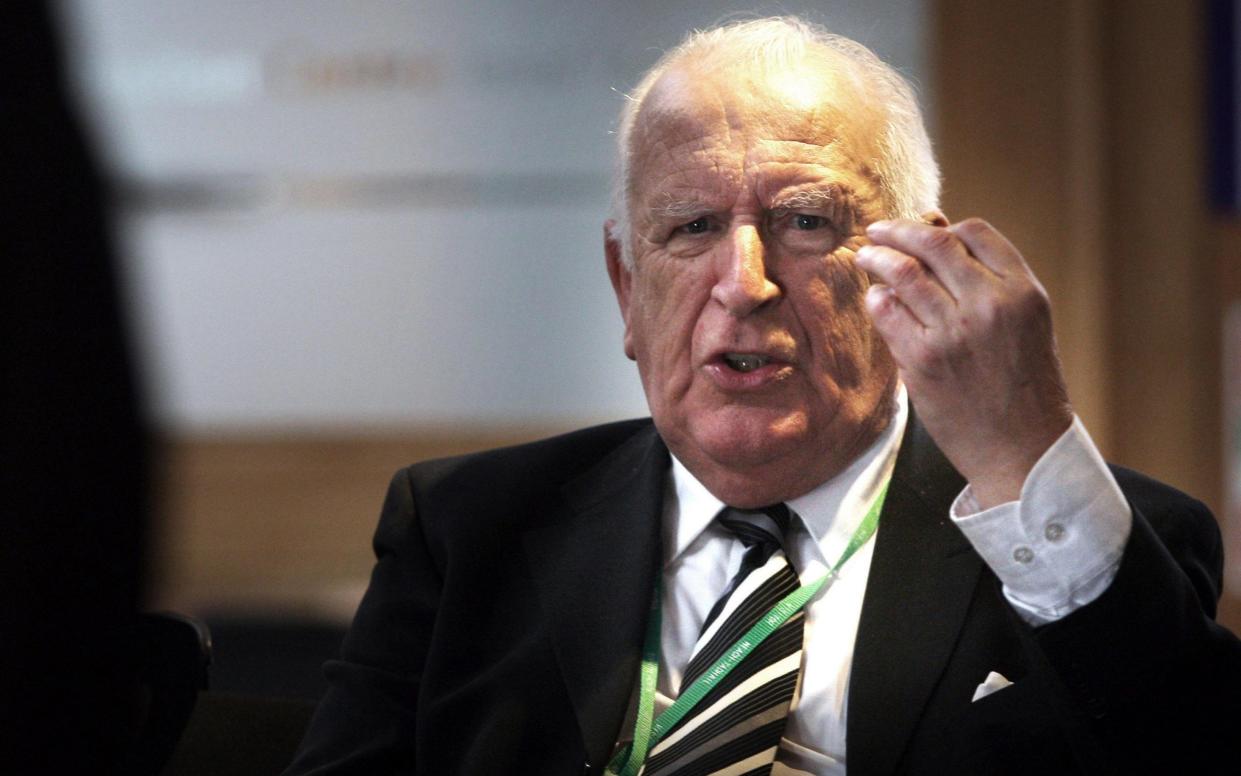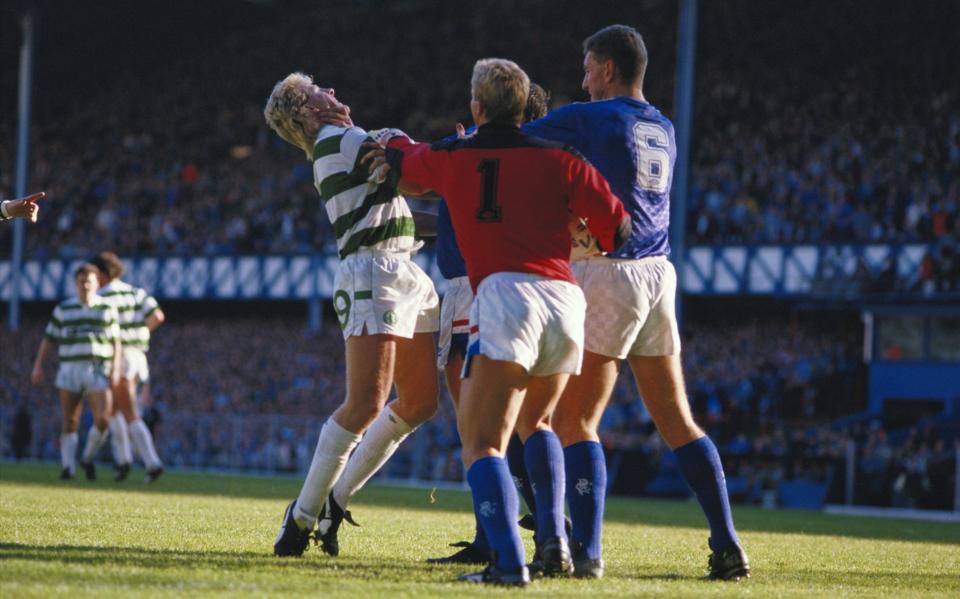Len Murray, defence lawyer whose work for STV helped to bring about the 1991 War Crimes Act – obituary

Len Murray, who has died aged 90, was a leading defence lawyer in Scotland where he acquired the nicknames “the Pleader” and “the Silver Fox”.
His clients included Paul McCartney, for whom he acted when police found cannabis plants at his farm in Argyll in 1972. The former Beatle accepted Murray’s advice to plead guilty and was fined £100. Six years later Murray represented Billy Connolly when the actor and comedian was charged with assaulting a newspaper reporter. When the paper published a story about the incident, Murray successfully argued that it was in contempt of court, and proceedings were dropped.
But Murray’s finest achievement was helping to defend the television company STV after it broadcast a documentary about Anton Gecas, an Edinburgh guest house owner, claiming that he had been responsible for the murder of tens of thousands of Jews, partisans and communists in Lithuania and Belarus during the German occupation of the Baltic states, as the commander of a platoon of the 12th Lithuanian Police Auxiliary Battalion.
In 1987 Murray, as STV’s legal adviser, sanctioned the first broadcast of the documentary, Crimes of War, which helped to persuade Margaret Thatcher’s government to introduce what became the 1991 War Crimes Act. When the station decided to repeat the documentary in 1989, however, Gecas won an interdict, forcing it off the air mid-transmission, and subsequently sued for defamation, seeking £600,000 in damages.
In gathering evidence, Murray travelled to the then Soviet Union to interview men who had served in Gecas’s platoon. One, Juozas Aleksynas, recalled how “he had helped [Gecas] line up thousands of Jews, throw them into mass graves and then bury them alive,” Murray recalled in a 2002 memoir, The Pleader. “He told me also how on other occasions they had machine-gunned thousands who had been herded into mass graves.”
Aleksynas had served 25 years in a Siberian labour camp, but Gecas fled to the West, changed his name in the chaos that followed the fall of Berlin, and settled in Edinburgh where he worked as a mining engineer and opened a B&B.
In July 1992, in a written judgment, Lord Milligan ruled that Gecas was a war criminal, leading to pressure on Scottish legal authorities to bring the first criminal proceedings under the new Act. But an arrest warrant was only issued in 2001. It should have led to immediate extradition and trial in Lithuania, but the warrant was not served because Gecas was too ill to travel. He died in September 2001 after suffering a stroke.
Murray observed that Nazi war hunters had known for years about Gecas – including the fact that he was living in Edinburgh – but that British governments had failed to act. “There is many a person in government who has a great deal to answer for,” he said.
Leonard George Murray was born into a Catholic family in the Knightswood area of Glasgow on August 1 1933, the youngest of five children of a primary school headmaster. As a schoolboy he represented Scotland at tennis and showed proficiency at languages, winning an essay competition organised by the Hispanic Council of Great Britain.
He went up to Glasgow University to read modern languages but in his second year he contracted tuberculosis meningitis and spent six months in hospital. He returned to his studies in 1954 but switched to law, graduating in 1957.
For much of his career Murray was associated with the Glasgow law firm of Levy & McRae, establishing a reputation as an able defence solicitor and cross-examiner.
He began his career in the days of the death penalty, and in 1959 he helped represent James Watson, who had been accused of murdering a prostitute. Had Watson been found guilty of capital murder, a death sentence would have been automatic. In the event he was found guilty of the lesser charge of non-capital murder and given a life sentence.
The following year, Murray received a desperate phone call from the parents of Tony Miller, a 19-year-old youth who had been charged with capital murder. Miller and James Denovan had been charged with murdering John Cremin, a homosexual thief in his 50s. Denovan, aged 16, had instigated the crime and then blamed his friend, but due to his age was ineligible for the death penalty. The jury convicted Miller of capital murder and Denovan of non-capital murder.
Miller was sentenced to hang on December 7, a sentence delayed as Murray and Miller’s parents launched a campaign to save him from the noose. “We got support from MPs and members of the House of Lords, and got 30,000 signatures. I’m sure that it got more support than any other Scottish petition for the Royal Prerogative,” Murray recalled.

But on December 19 the Secretary of State for Scotland rejected the petition. Miller was hanged on December 22 in the grounds of Barlinnie jail.
The case turned Murray into a fervent opponent of the death penalty. Although there was little doubt that Miller was guilty of killing a man, he had not been in trouble with the law before, and his parents were, as Murray put it, “decent hard-working people”. The punishment, he said, “was a punishment of his family... Those poor souls would carry that cross for the rest of their lives.”
Murray was a lifelong Celtic supporter, but was called in to represent players from both Celtic and Rangers after a fracas during a match at Ibrox in October 1987 involving the Celtic striker Frank McAvennie and the Rangers keeper Chris Woods. In the melee that followed, both men were ordered off, joined by Woods’s colleague, Terry Butcher. A third Rangers player, Graeme Roberts, was booked.
There the matter might have ended. But Glasgow’s procurator fiscal decided to intervene and the four players were charged with breaches of the peace. Fourteen days after the game, McAvennie’s agent called Murray and asked him to represent the Celtic player – and, simultaneously, a lawyer acting for Rangers turned up on Murray’s doorstep wanting him to represent the Rangers boys. The trial lasted several days amid huge publicity. McAvennie was cleared; Roberts was found not proven, and Butcher and Woods were both found guilty and fined.
Murray, who feared sectarian repercussions, felt that the trial was a “terrible error of judgment”. While it did not lead to the unrest Murray feared, he discovered that rival Glasgow solicitors had tried to persuade the Rangers board to stop hiring Murray because he was a Catholic: “I regarded it as an enormous tribute to the integrity of the board that they treated these offers with the contempt they deserved.”
Murray was a gifted anecdotalist with a theatrical streak, which served him well when he was appointed the Law Society of Scotland’s first media spokesman. After his retirement in 2003 he became a popular after-dinner speaker. As a Burns scholar he travelled extensively to deliver The Immortal Memory at Burns Night suppers and became dean of the Guild of Burns Speakers in 2019.
In 1957 Len Murray married Elizabeth Wilson. She died in 2005 and he is survived by two sons. Another son died in 2020.
Len Murray born August 16 1933, died December 22 2023

